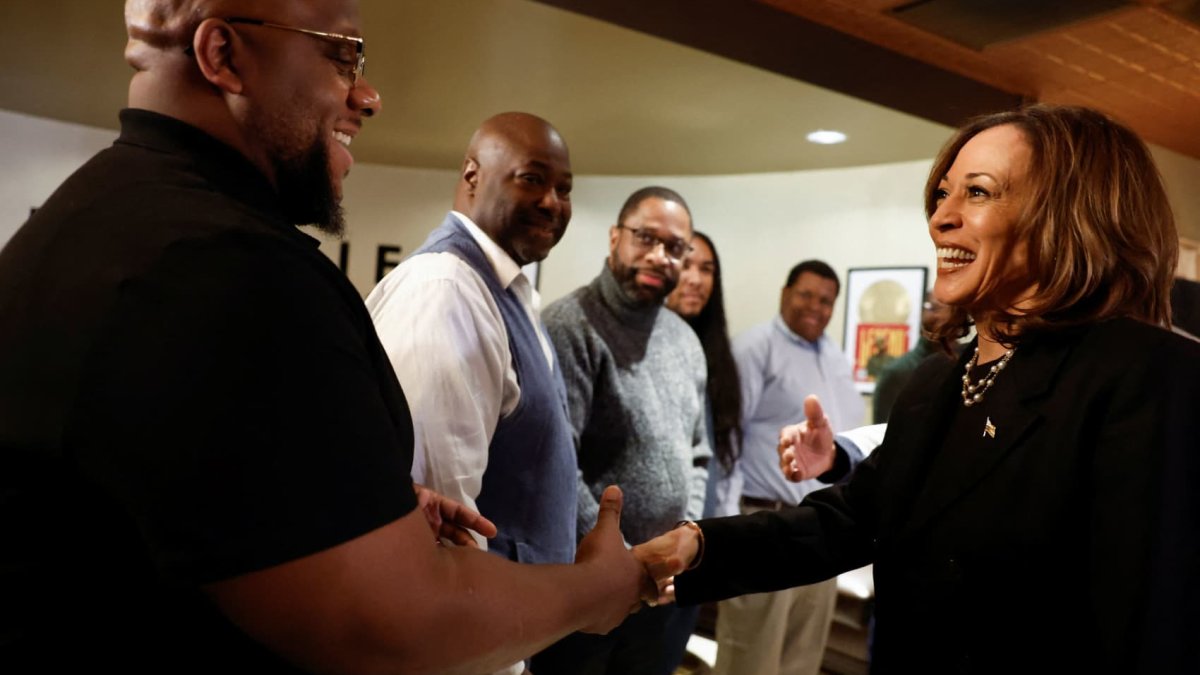- Black business owners and business leaders are becoming more vocal in their support for Vice President Kamala Harris in the presidential election.
- A new poll shows that 59% of black men under 50 support Harris; an increase from 51% in August.
- The Trump campaign said it is also reaching out to black voters and black business owners.
When you order a cheesesteak from Jim’s West in Philadelphia these days, you get something else free from owner Cortez Johnson: an endorsement from the Vice President Kamala Harris in the presidential elections.
“I support it for a lot of reasons. It’s definitely for the community. It’s definitely for small business,” Johnson recently told CNBC.
Signs endorsing Harris, the Democratic presidential nominee, hang inside the restaurant in a predominantly black neighborhood in the battleground state of Pennsylvania.
The vice president visited Jim’s West in May to have a steak and talk about black businesses. Since then, Johnson has been a vocal supporter.
“She’s definitely down to earth, especially in Philadelphia,” Johnson said. “I’m looking for a willingness to help us thrive and build small businesses.”
Johnson and other black male voters have been a key demographic target for the Harris campaign since its somewhat unconventional start in July, when President Joe Biden ended his re-election campaign.
It is also a group whose political allegiances have shifted in recent years. In 2020, only 12% of black men voted for former President Donald Trump. This cycle, Trump, the Republican presidential nominee, has made inroads, though polls vary widely on exactly how much.
Harris in September emphasized the need to earn the trust of black male voters during a conversation with the National Association of Black Journalists.
“I think it’s very important not to operate under the assumption that black men are in somebody’s pocket,” Harris said. “Black men are like any other voting group. You have to win their vote. So I’m working to win the vote, not assuming I’m going to have it because I’m black.”

Democratic U.S. Vice President Kamala Harris speaks at a campaign rally at Enmarket Arena during a two-day campaign bus tour in Savannah, Georgia, on August 29, 2024.
Others are also working to help Harris win those votes, leading up to the final week of the election. On Monday, more than 5,000 participants joined a video call hosted by the Black Economic Alliance, a coalition of business leaders and advocates focused on economic development in the black community.
“We’re looking forward to this because black men can decide this election,” BEA co-chair Tony Coles said on the call. “There are decisive margins from us blacks in every battleground state… it’s literally in our hands.”
A survey conducted by the BEA found that black male voters were more interested in hearing from black business leaders about the election and economic issues.
Speakers and participants supporting Harris on the call included BEA co-chairman Charles Phillips, who is the co-founder and managing partner of Recognize; former American Express CEO Ken Chenault, former Merck CEO Ken Frazier, Essence Ventures chairman Richelieu Dennis, US Black Chambers CEO Ron Busby and Gathering Spot CEO Ryan Wilson.
“We need to make sure we have institutions that are here fighting on behalf of our business owners, our communities, as well as our families,” Busby said on the call.
Several speakers highlighted Harris’ policy proposals focused on economic issues in the black community, which were posted on the campaign’s website in October under the headline “Harris Will Deliver for Black Men.”
The proposals include support for 1 million forgivable loans of up to $20,000, a National Health Equity Initiative for black men and down payment assistance for first-time home buyers.
“Now there’s an opportunity for her to lead, for her to run these things herself, and I think you’re going to see some incredible results,” Dennis said on the call.

A supporter looks on as U.S. Vice President, Democratic presidential candidate Kamala Harris delivers a speech on the National Mall, a week before the November 5 U.S. presidential election, in Washington, U.S., October 29, 2024.
Recent polls from the NAACP show that Harris has gained ground with black men under 50 in the past month: In October, 59% said they were likely to vote for Harris, up from 51% in the same poll in August.
“The next good thing she’s done is just acknowledge that the votes of black men matter,” said Phillips, who is also a Harris campaign surrogate. “No one has asked for their vote before. It’s just that ignorance was a problem in general” for the Democratic Party.
Black people and business leaders are also a key demographic for Trump, said Trump campaign spokeswoman Janiyah Thomas.
“Team Trump’s outreach to black male voters and the black business community is based on real, face-to-face engagement,” Thomas told CNBC. “We are holding listening sessions and connecting directly with men of color, who are leaders in their families and communities, to understand their needs and provide sustainable solutions.”
However, speakers at the BEA call questioned the notion that Trump is committed to black voters and businesses.
“You can rock with [Harris] and get probably about 90% of what you want, or go with it [Trump] and you get nothing,” the Rev. Michael Blake, founder of the Kairos Democracy Project, said in the call.
Wilson, the CEO of the Gathering Spot, told CNBC that he is focused on educating black voters about Trump’s economic policies, including tariffs he believes would be harmful to black businesses.
“It’s important that business leaders get involved because the former president is putting forward some pretty dangerous policy proposals,” Wilson told CNBC. “Look at the opinions of economists who say his policies would be inflationary and increase the debt.”
